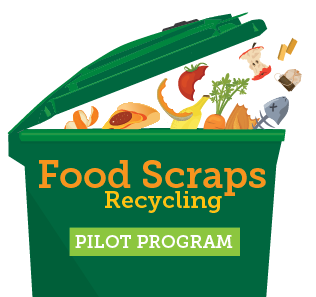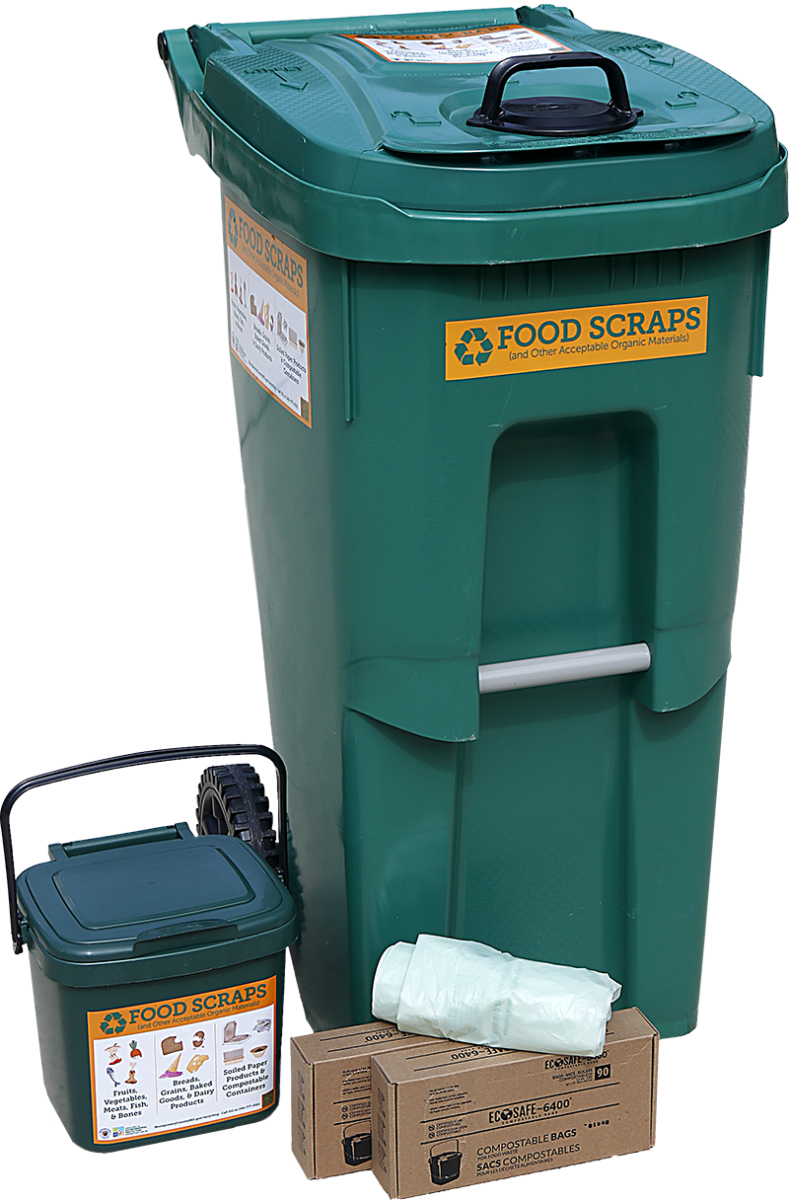Single-Family Residential Food Scraps Recycling Pilot
 The Montgomery County Recycling and Resource Management Division is continuing to run its single-family residential curbside food scraps recycling and composting pilot. This pilot program began in November of 2021 to demonstrate the feasibility of adding curbside food scraps collection for recycling as part of Montgomery County's curbside recycling collection program for single-family homes.
The Montgomery County Recycling and Resource Management Division is continuing to run its single-family residential curbside food scraps recycling and composting pilot. This pilot program began in November of 2021 to demonstrate the feasibility of adding curbside food scraps collection for recycling as part of Montgomery County's curbside recycling collection program for single-family homes.
This program consists of three pilot areas. Two of the pilot areas are located in portions of Subdistrict A—a part of Silver Spring and a part of Bethesda/Rockville—and one is located in a portion of Subdistrict B in a part of Potomac.
Weekly curbside food scraps recycling collection is provided to all three pilot areas on their normally designated County-provided recycling collection day. Normal food scraps recycling collection days are as follows:
- Bethesda/Rockville pilot area: Monday
- Potomac pilot area: Tuesday
- Silver Spring pilot area: Thursday
If you live in any of the designated areas, do not already separate your food scraps for recycling and pay for a private food scraps collection service, and are interested in participating in this pilot, you are eligible to sign up to participate. Click on the link below to see if you reside in one of the three pilot areas.
We are still recruiting additional participants!
We continue to recruit single-family residents in all three of the pilot areas who are interested in volunteering to participate in this exciting pilot program. Once we reach our limit of 850 participants in each pilot area, registration will be closed for that area.
Do you reside in a pilot area? Look Up Address and Register
Look Up for Your Address and Register
Residential Pilot Map
Zoom in to see the pilot areas.
View larger map
How will the pilot program work?

- One 35-gallon green wheeled cart with a locking lid for food scraps for curbside recycling collection.
- One 2-gallon in-kitchen/countertop food scraps collection bin for storing your food scraps until you are ready to place the food scraps in the 35-gallon green food scraps recycling wheeled cart.
- Two boxes of compostable bag liners for your in-kitchen bin.
- An instructional brochure on the food scraps recycling pilot program, a refrigerator magnet, and a laminated card that includes a list of acceptable and unacceptable materials.
Missed Food Scraps Recycling Collections
If your food scraps recycling collection cart does not get serviced by 5:00 p.m. on your regular food scraps recycling collection day, please immediately call MC311 by dialing 311 or 240-777-0311 (outside of Montgomery County). Leave your cart at the curb and we will arrange for our collector to service your cart the next day.
How will I recycle my food scraps?
- Place the compostable bag in the in-kitchen bin.
- Separate your food scraps from other waste for recycling by placing the food scraps in the in-kitchen bin (or any other temporary storage container of your own that you prefer to use).
- When full, tie the compostable bag of food scraps closed and place the bag of food scraps into the 35-gallon green wheeled food scraps recycling cart.
- On your designated County-provided curbside recycling collection day, place the 35-gallon green food scraps recycling wheeled cart at the curb by 7:00 a.m. Our dedicated food scraps recycling collection truck will empty your cart and take your food scraps to the composting facility.
- Place only acceptable food scraps or other acceptable organic materials into the 35-gallon food scraps recycling wheeled cart. Please DO NOT place yard trim (grass, leaves, branches, or garden trimmings) or any other materials in the green food scraps recycling cart.
What goes in my bin?
- Fruits and vegetables (please remove stickers)
- Dairy products (milk, butter and cheese)
- Bread, pasta and grains
- Seafood
- Eggs and eggshells
- Coffee grounds and paper coffee filters
- Tea bags
- Meat (including bones)
- Greasy pizza boxes
- Corrugated fruit and vegetable boxes
- Spoiled food
- Food-soiled paper
- Paper plates (uncoated or compostable)
- Paper towels and paper napkins
- Compostable bags
- Certain types of compostable food service ware products
- Plastic bags, wrappers or film
- Polystyrene/Styrofoam™
- Plastic bottles, jars, containers, etc.
- Plastic utensils
- Aluminum or steel/tin cans and foil products
- Foil-lined or plastic-lined paper
- Glass of any kind
- Pet waste, including cat litter
- Ceramic or plastic dishes
- Pots or pans
- Latex or rubber gloves
- Hair nets
- Facemasks
- Facial or toilet paper
- Diapers
- Grease or fats
- Raw dough
- Keurig®-style coffee pods
What are the benefits of recycling food scraps?
- Promotes plant health by providing valuable nutrients
- Reduces the need for chemical fertilizer
- Loosens and aerates the soil
- Reduces runoff and the frequency of needed watering by helping the soil retain moisture
By removing these materials from the waste stream and recycling them into a useful product, we can reduce the amount of waste processed at our Resource Recovery Facility (RRF) and reduce our carbon footprint.
Recycling food scraps also reduces the need to use garbage disposals to dispose of food scraps. When you use a garbage disposal to dispose of unwanted food, excess nutrients are sent to the WSSC Water wastewater treatment plants.
Frequently Asked Questions about Montgomery County’s Single-Family Residential Food Scraps Recycling Collection Pilot (FAQs)
When is my designated food scraps recycling collection day?
- Bethesda/Rockville pilot area: Monday
- Potomac pilot area: Tuesday
- Silver Spring pilot area: Thursday
When my recycling day slides to the next day due to a holiday or an inclement weather delay, will my food scraps recycling collection day slide as well?
Your food scraps recycling collection day of the week will not change from week to week, except when your County-provided recycling collection service slides due to a designated holiday, or in the event of severe inclement weather that prevents the County’s collector from safely collecting. The Recycling and Resource Management Division will send you email notifications if there is any change to your food scraps recycling collection schedule.
Do I have to put my food scraps recycling cart out at the curb every week?
No, you decide when you put your cart out for collection. Our collector will run the route in your pilot area every week on your designated collection day. If your cart is at the curb , it will be emptied. If it is not, no worries. We will be back the following week.
Do I have to wait until my cart is completely full to put it out?
No, our collector will empty your curbside cart on a weekly basis no matter how much or how little it contains.
Do I need to use the compostable liners provided? Can I put food scraps directly into the 35-gallon curbside food scraps recycling cart?
No, you are not required to use the provided compostable liners. Food scraps may be placed directly into the 35-gallon food scraps recycling collection cart. These compostable liners are provided as a convenience to help keep your in-kitchen bin and the 35-gallon curbside food scraps recycling cart clean. The use of the compostable liners is entirely optional.
Do I need to cut up large food scrap items, such as pumpkins or pizza boxes, before placing them in the 35-gallon curbside food scraps recycling cart?
No, larger items may be placed directly in the 35-gallon curbside food scraps recycling collection cart. As long as large items fit in the cart and the lid can be completely closed and locked, larger items do not need to be cut or torn into smaller pieces. Please do not leave any type of food scraps outside of the 35-gallon curbside food scraps recycling cart.
What happens when I run out of the compostable liners provided?
When you run out of compostable liners, you will need to purchase more acceptable liners yourself. The size and brand of compostable liner provided in the starter kit may be purchased online from several vendors. Only certain types and brands of compostable liners are Acceptable. Check out Acceptable Compostable Liners.
Are nut shells, pits, skins, and seeds acceptable?
Yes, nut shells, pits (e.g., peach, plum, avocado), skins, and seeds are acceptable items in the pilot program and may be placed in your 35-gallon curbside food scraps recycling cart.
Are organic (wood) corks acceptable?
No, organic corks are not acceptable in the food scraps program. There are several grocery stores in the area that have cork collection programs, however, including Whole Foods Market, MOM’s Organic Market, and Roots Market.
Is dryer lint acceptable?
No, we ask that you do not place dryer lint in your food scraps recycling cart. This is because it may contain microplastic fibers from polyester clothing.
Are shellfish shells acceptable?
Yes, all seafood including oyster, clam, mussel, crab, lobster, and shrimp shells are acceptable.
What paper products are acceptable for the food scraps pilot?
Only non-lined and non-coated food-soiled paper items such as paper napkins, paper towels, and paper plates should be placed in your food scraps cart. Plastic- or foil-lined and wax- or plastic-coated paper items should not be placed in your food scraps cart. Any clean, dry paper should be recycled in your blue mixed paper recycling wheeled cart.
Is parchment paper acceptable?
No, parchment paper should not be placed in your food scraps cart. Some brands may contain silicone, which is not compostable.
How do I prevent or address fruit flies, ants, flies, and maggots?
One way to avoid insect pests and prevent your foods scraps and compostable liners from breaking down (especially in the summer months) is to freeze your food scraps and not place them in your curbside cart until the day before or day of collection.
To address maggots (and prevent more flies), you can add lime juice or other citrus juices to the bin. Similarly, sprinkling with baking soda to absorb liquids (and odors) also can help prevent maggots. Spraying the maggots with white vinegar is another option.
Flies and mosquitoes do not like the smell of lavender, citronella, clove, peppermint, basil, cedarwood, eucalyptus, peppermint, lemongrass, and rosemary. Sprinkling one of these in your cart may help deter these insects.
What is the best way to clean my curbside cart?
Hose your cart down periodically using soapy water and a little bit of lemon juice to cut odors. Sprinkling baking soda inside your cart will help absorb liquids and odors, and also can help prevent maggots.
Can we get compost back?
Unfortunately, we are not able to provide finished compost back to pilot participants at this time. Currently, we take the collected food scraps to the Prince George’s County’s Western Branch Composting Facility for processing, and we do not receive finished compost from this facility.
Contact Us
Email [email protected] or call 311 or 240-777-0311.